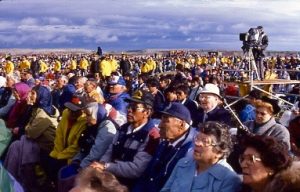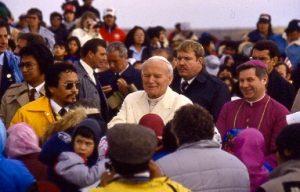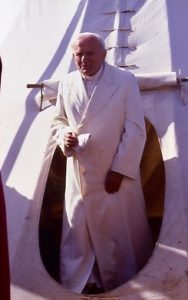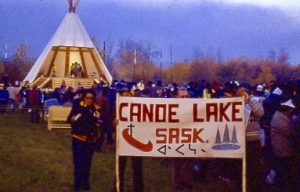Faithful Grace and Grateful Ministry –
St. Pope John Paul II
(Eph 2:1-10; Ps 100; Lk 12:13-21)
***********************************************
“One’s life does not consist in the abundance of possessions.”
The Word Among Us serves as an initial resource for this reflection. It states that Jesus has just spoken at length to a large crowd about the riches awaiting those who believe in him. He has just finished telling them not to worry about what their future would look like, because God would care for them. But then, someone interrupts, “Tell my brother to share my father’s inheritance with me,” he demands. It’s a wonder Jesus didn’t groan in frustration! Aside from being rude, the interruption demonstrates the kind of attachments that keep people impoverished.
Jesus taught it is not lack of material possessions that makes us poor. Rather, it’s preoccupation with what and how much we have – and how to get more of it, that impoverishes us. Why? Because it moves our attention away from the riches God has for us. It shifts our thoughts and efforts from serving our Creator and focuses us on created things instead. Jesus doesn’t say material possessions are bad or to be despised. He is clear, however, that “one’s life does not consist of possessions” (Lk 12:15).
What are the things that “matter to God” (Lk 12:21)? First, that we would know his love for us personally. He created us out of love, and he loves us always. Second, that we matter to him – so much so we can trust him always to take care of us. Third, that Jesus died and rose so we could experience God’s transforming grace in our lives. And finally, that confident in his love for us we would dedicate ourselves to loving and serving the people around us, especially those in need.
These are the riches we can steep ourselves in no matter how rich or poor we are materially. Every time we pray, we can tell God how much we love God. Better still, we can hear him tell us how much he loves us. Every passage of scripture can become another sign of that love and show us how to deepen our experience of that love. Reading the lives of the saints or spiritual books, attending daily mass – through all these ways, we can store up for ourselves all the things that matter.
In the first reading today to the Ephesians, St. Paul tries to outdo himself in driving home to them (and to us) how all is gift and grace from God. We were lost in sin and slaves to our own passions. It is by God’s grace and mercy, and faith in Jesus, we are not only saved but also “raised up with Christ” – given a share in the eternal life of the Trinity here and now. That is called “realized eschatology” in theological terms – heaven begins mow in the lives of those who believe.
Our response to that free gift is important, and it must remain a response, not an effort to take back the reins and somehow think we can in any way earn God’s love so freely given. Paul insists on this truth: “… this is not your own doing; it is the gift of God. This is not the result of works, so that no one may boast.” He goes on to underline “we are what God made us, creating us in Christ Jesus for good works which God prepared beforehand to be our way of life.”
So, our ministry and good works are never to be an attempt to make ourselves holy; rather, they are to be the result, the fruit of God loving us so much. The best way to respond to God’s awesome love for us, God’s forgiveness and healing, is to be a force for good, sharing God’s love for the world, with the world.
The psalm seconds this message – it is the Lord who has made us, we belong to God and are to respond with lives full of praise, gratitude and joy. An addendum to the gospel message from Jesus is to live simple lives, or as it is put in social justice circles, to live simply so others can simply live..

Site of papal visit Fort Simpson
Today the Church remembers and honors Saint John Paul II, who in his own inimitable way lived these readings. Karol Józef Wojtyla, known as John Paul II since his October 1978 election to the papacy, was born in Poland in 1920. He was ordained to the priesthood in 1946 and appointed Archbishop of Krakov in 1964 by Pope Paul VI, who made him a cardinal in three years later. Besides taking part in Vatican Council II (1962-1965) where he made an important contribution to drafting the Constitution Gaudium et Spes, Cardinal Wojtyla participated in all the assemblies of the Synod of Bishops. After the death of Pope John Paul I in 1978, the Cardinals elected him Pope at the Conclave of October 16, 1978 and he took the name of John Paul II.

Crowd waiting for JP II to arrive
On September 9 1984, John Paul II became the first pope to step foot on Canadian soil when he launched a 12-day, 15,000 km marathon pastoral visit taking him from the Atlantic to the Pacific. Millions of Canadians turned out to greet him, to pray and to celebrate with him. Speaking to crowds in English and in French, the Holy Father made more than 30 major addresses as well as many other statements.

With Bishop Denis Croteau OMI of McKenzie-Fort Smith Diocese
In June 1987, John Paul II returned to Canada to fulfill a promise to meet with the Indigenous Peoples of the north in Fort Simpson, NWT, a visit thwarted by foggy conditions in 1984.

Emerging from teepee vestry, taken from teepee sanctuary
His love for young people brought him to establish the World Youth Days. The nineteen WYDs celebrated during his pontificate brought together millions of young people from all over the world. The attendance of Pope John Paul II for WTD 2002 in Toronto was the third official visit of the Holy Father to Canada. More than 800,000 people crowded Downsview Park for the closing papal mass on July 28, 2002.

John Paul II’s pontificate, one of the longest in the history of the Church, lasted nearly 27 years. He died on April 2nd, 2005, the vigil of Divine Mercy Sunday, and was canonized on April 27th, 2014 by Pope Francis. John Paul II is the patron saint of World Youth Day. In Canada April 2ndis known nationally as St. John Paul II Day.
The Eucharist so loved by Pope John Paul II that also sustained him throughout his long pontificate, makes present in Word and Sacrament God’s unconditional love and grace for us. May our celebration deepen our faith in that love and empower us to respond with grateful praise and joyful selfless ministry to others.




Well today’s readings reflects a clear detail who Jesus Christ really is and Pope John Paul II. It explains who John Paul really is and how he became the pope. We are always talking about love and mercy like having the heart to show love to others like loving our neighbours and loving God. Whether we are hearing God’s words and messages through celebrations and private moments; he will continue to love us all the time. We can keep on committing sins and do faults in our lives God and Jesus forgives us and heal us. John Paul II is the same thing when he visits people and their countries like the Aboriginal people. Basically, the pope represents Jesus Christ by experiencing his pain and sufferings and his teachings to young adults of what we are to make of this world. What the world should be like. So, this is a way to deepen our faith and understanding by hearing the words of God and reading Saint books and passages. Amen . Rejoice!
Thanks Bishop Sylvain for the following homily and message about Pope John Paul II and learning how to love that comes from our hearts. It is a lovely and heartwarming homily and pictures. Gracias ! Bravo !
When I was small I saw Pope John Paul II as Jesus Christ. Oh, it is Jesus Christ . It is Jesus Christ. I pretty much adore him.